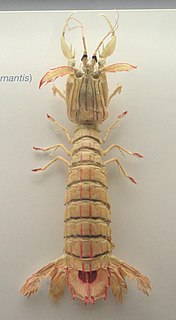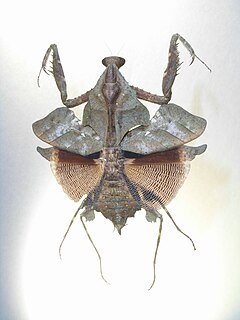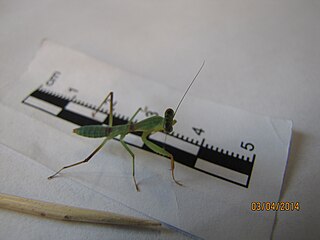
Squilla mantis is a species of mantis shrimp found in shallow coastal areas of the Mediterranean Sea and the Eastern Atlantic Ocean: it is also known as "pacchero" or "canocchia". Its abundance has led to it being the only commercially fished mantis shrimp in the Mediterranean.

Choeradodis is a genus of praying mantises with common names such as shield mantis, hood mantis, and leaf mantis because of their extended, leaf-like thoraces. The distinguishing characteristic of Choreododis from which it takes its common names is a laterally expanded thorax. This adaptation for the purpose of camouflage, as well as a rounded wing case and a habit of staying relatively flattened, aid its leaf mimicry.

Phyllocrania paradoxa, common name ghost mantis, is a small species of mantis from Africa remarkable for its leaf-like body. It is one of the three species in the genus Phyllocrania. It is known for its distinct and exclusive camouflaged appearance of a dry weathered leaf.
Deroplatys desiccata, known by the common name giant dead leaf mantis, is a praying mantis from Southeast Asia. This is the type species of genus Deroplatys.

Deroplatys lobata, common name Southeast Asian dead leaf mantis or dead leaf mantis, is a species of praying mantis that inhabits Thailand, Java, Borneo, Indonesia, Sumatra and the Malay Peninsula.

Dead leaf mantis is a common name given to various species of praying mantis that mimic dead leaves. It is most often used in reference to species within genus Deroplatys because of their popularity as exotic pets. Examples include D. desiccata, D. lobata, and D. philippinica. Other species to which the term may apply include Acanthops falcataria, A. falcata, and Phyllocrania paradoxa.

Tamolanica tamolana, common name New Guinea shield mantis, is a species of praying mantis native to New Guinea.

Choeradodis rhomboidea, common names tropical shield mantis, hood mantis, and leaf mantis, is a species of praying mantis. A native of Central America, C. rhomboidea is a lowland species.

Choeradodis stalii is a species of praying mantis with common names that include tropical shield mantis, hooded mantis, and leaf mantis. It is found in Brazil, Ecuador, French Guiana, Panama, and Peru.

Choeradodis rhombicollis, or Peruvian shield mantis, is a species of praying mantis native to North America, Central America, and South America. It is found in Belize, Costa Rica, Ecuador, French Guiana, Guatemala, Colombia, Mexico, Nicaragua, Panama, Peru, and Surinam.

Leaf mantis is a common name for certain praying mantises including:
Shield mantis, hood mantis and leaf mantis are common names for certain praying mantises with an extended thorax aiding it in camouflage and leaf mimicry. The terms are used for species in the following genera:

Rhombodera is a genus of praying mantises native to Asia and possessing common names such as shield mantis, hood mantis, and leaf mantis because of their extended, leaf-like thoraxes.
Asiadodis is a genus of praying mantises native to Asia and possessing common names such as shield mantis, hood mantis, and leaf mantis because of their extended, leaf-like thoraxes.
Boxer mantis is a common name given to various species of praying mantis. The name comes from the way these mantises move their oversized grasping forelimbs as they communicate with each other.

Bark mantis is a common name given to various species of praying mantis, especially those with cryptic camouflage resembling tree bark. Examples include:
Ground mantis is a common name given to various species of praying mantis believed to hunt on or near ground level rather than high amid foliage.

Rhombodera valida is a species of praying mantises in the family Mantidae, found in Indomalaya.

Mantises are an order (Mantodea) of insects that contains over 2,400 species in about 430 genera in 30 families. The largest family is the Mantidae ("mantids"). Mantises are distributed worldwide in temperate and tropical habitats. They have triangular heads with bulging eyes supported on flexible necks. Their elongated bodies may or may not have wings, but all Mantodea have forelegs that are greatly enlarged and adapted for catching and gripping prey; their upright posture, while remaining stationary with forearms folded, has led to the common name praying mantis.














